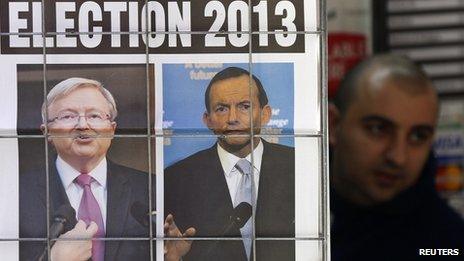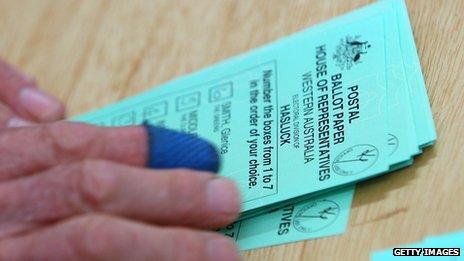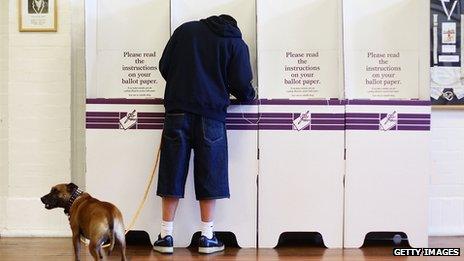Australia election: Why is voting compulsory?
- Published
Australians give their views on mandatory voting: ''Everyone should be made to exercise their voting right''
Is compulsory voting in a democracy a contradiction in terms? That is the question some Australians have been asking since voting became required by law here nearly a century ago.
The right to vote is a freedom fiercely sought by people all over the world, but Australians do not have a choice.
The continent is part of a small minority of just 23 countries with mandatory voting laws. Only 10 of those enforce them.
Registering to vote and going to the polls are legal duties in Australia for citizens aged 18 and over, and failing to do so can result in a fine and potentially a day in court.
Opponents of the system like Libertarian columnist Jason Kent say this stifles political freedom and threatens the basic principles of democracy.
"People have been sentenced to jail terms for not voting. It's disgusting. It's far from being democratic. We are not a democracy if we can't vote democratically."
But Dr Peter Chen, who teaches politics at the University of Sydney, warns that this type of heated rhetoric blows things out of proportion. He says showing up to the polls every so often is not a huge burden.
"The system demonstrates a social expectation that at a minimum everyone needs to participate every few years and that's a good thing."
High turnout 'myth'

Failing to vote in Australia may result in a fine or a day in court
Although small, the A$20 (about $18, £12) fine is enough to drive voters to the polls in substantially greater numbers than countries with voluntary voting.
Supporters of the system say Australia boasts some of the highest civic participation in the world, with a reported 94% voter turnout in the last federal election, compared with about 65% in the UK's 2010 general election and an estimated 57% in the 2012 US presidential election.
The tides may be changing though, according to Mr Kent, who says high voter turnout here is overstated.
"High voter turnout is a myth when you consider that 10% of Australians are not even registered. When that myth is debunked, I think you'll see a dramatic shift in public perception of compulsory voting," he said.
That number only reflects registered voters who turned out, and although required by law, in recent years voter registration has seen a slight decline, especially among younger Australians.
According to the Australian Election Commission, a third of the overall number of eligible voters who are not enrolled are between 18 and 24 years old. Prime Minister Kevin Rudd has made mobilising the youth vote central to his 2013 campaign.
Long-time political insider and commentator Paula Matthewson, who makes a conscious decision not to vote and pays the fine instead, says the problem goes beyond young voters.
"The idea that high voter turnout based on compulsory voting translates into a politically engaged electorate is nonsensical. If we moved to a voluntary system, with the level of disenchantment and disengaged voters we have now, no one would vote."
Engaging voters

Some people are choosing to spoil their ballots rather than vote
And there has been an increase in recent years of what Australians call informal or spoilt ballots - instances where voters either mistakenly or intentionally submit a ballot that is blank or improperly filled in, which cannot be counted in the final tally.
Spoilt ballots count for around 6% of the total votes cast in the 2010 election. Taken together with the number of eligible voters who fail to register, the actual percentage for voter turnout in Australia's federal elections hovers in the low 80s.
Mr Kent says that these statistics show that forcing people to vote does not translate into an engaged electorate. He argues that a non-compulsory voting system would encourage Australians to be more involved.
"If voting was democratic, politicians would be beholden to the voters, they couldn't hold a gun to our heads and force us to vote, they'd have to give us a good reason to vote. They'd have to inspire us."
The idea of abolishing mandatory voting is a familiar topic in Australian politics, most famously espoused by former Liberal cabinet member and Senator Nick Minchin, who is an outspoken opponent of the system.
Earlier this year, the Queensland Liberal Party released a discussion paper on election reforms that included a section on the possibility of ending compulsory voting.
The move was met with outrage from senior Labor party figures, including then Prime Minister Julia Gillard who tweeted: "Fight @theqldpremier's plan to end compulsory voting. Don't let the Liberals make our democracy the plaything of cashed-up interest groups.''
Mr Rudd also broached the topic in a wide-reaching Green Paper released in 2009 asking: "Do you think compulsory voting should continue in Australia?"
Who benefits?
There have been no policy initiatives on the subject from the Labor government at that time or since.

Voter turnout in the last federal election was reported at 94%
It is widely believed that the Liberal party would have the most to gain if a voluntary voting system were adopted here but James Campbell, state politics editor of the Herald Sun newspaper, explains that the issue is not black and white.
"Both parties have toyed with the idea of abolishing mandatory voting, but the reason it never happened is no-one has been entirely certain about who would benefit from getting rid of it."
Rohan Wenn, spokesperson for the non-partisan political advocacy group Get Up!, says the system protects the rights of marginalised groups.
"If you look at the international experience, in non-compulsory voting systems, the people who don't vote are the poor and disenfranchised and those are exactly the people we think should be voting."
Regardless of partisanship, the current electoral system is largely supported across the country. Dr Chen explains that despite the ongoing debate, there is no sign of any serious measures to end compulsory voting in sight.
"Most Australians are quite comfortable with the electoral process and would be quite suspicious of efforts to change it. We trust the electoral system more than we trust our politicians.
"It's an irony, but we really like our democracy."